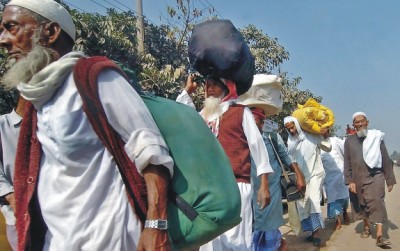Bishwa Ijtema: Can we organise it better?
Recently held "Bishwa Ijtema" at Tongi, on the outskirt of Dhaka, was billed as the second largest gathering of Muslims in the world after the Hajj. Well, it might well have been the largest! While the Hajj congregation is restricted by the Saudi government to about 2 - 2.5 million, the numbers of participants in Bishwa Ijtema were estimated to be 2.5 - 3 million. The annual congregation of the Tabligh Jamaat that started in a small way in the early 70s has now turned into a national event. For nearly a week, the entire capital takes the look of a Pilgrim City with Muslim males pouring from all over. Although in the initial years, the Ijtema was organised through private efforts, the government machinery increasingly got involved over the years. This year, there was a senior minister available on site 24-hours to monitor the organisational efforts. Thus it can be said that the Bishwa Ijtema has become a major government responsibility. So far, there has not been any major accident in the Ijtema, but the probability of disasters such as fire or stampede cannot be ruled out. With increasing numbers of Muslims from abroad arriving every year, the responsibility for the smooth conduct of the Bishwa Ijtema cannot be left alone to the Tablighi Elders; the Government, especially the Religious Affairs Ministry, should get involved in the organisational process at all levels. Below are some of my suggestions that could help us better organise the Bishwa Ijtema.The present Ijtema ground on the northern bank of the Turag River is already inadequate and unsuitable for holding a huge congregation. When the present site was chosen in the 70s, Tongi was a sleepy town with few industrial establishments - mostly closed and abandoned. The empty space on the river bank was adequate for holding the congregation then. But now Tongi falls within the Dhaka Metropolis. Industrial units, as well as the residential areas, are coming up all around the Ijtema ground. At the same time, the size of the congregation is increasing every year. Dhaka, an already crowded and congested capital, cannot bear the burden of an inflow of 2 - 3 million pilgrims every year. In fact, the city life comes to a virtual standstill during the Ijtema week. This year, the Ijtema crowd overflowed on to the southern bank of the Turag too. It has been reported that the government allotted additional land on the southern bank to the Tabligh Jamaat, cancelling few original allotments. However, this cannot be a permanent solution. We need to plan for the future when Bishwa Ijtema could become a truly world event. We need a space that would have enough room for expansion and planned development. One such area that comes to my mind is the huge uninhabited landmass that is available on either side of the Jamuna Bridge approaches. The sites are well-connected by road and rail, are well above the flood plain and could be easily developed to be the permanent site of the Bishwa Ijtema. Water supply, sanitation, electricity, telecommunication facilities could be developed and eventually hotels, restaurants and shopping malls could come up to cater to the needs of the devotees. People from all over the country as well as from abroad can easily reach the site without causing much disruption of the capital's normal life. The government should establish a suitable mosque on Ijtema site that could serve as the main 'Markaz' of the Tablig Jamaat. The shifting of the main 'Markaz' from its present location at the Kakrail Mosque would relieve the pressure of thousands of devotees that flock at Kakrail and then overflow into the Ramna Park causing much inconvenience to the park users. In the new site, the government should establish hygienic toilets, not the trench types at Tongi that throw human excreta into the Turag River. In course of time, we could build more and more permanent structures at the new Ijtema site to house the devotees. In fact, any investment into the infrastructure could pay the dividend in the form of greater economic activities in the area. I hope our policy makers as well as the Tabligh Elders would favourably consider the above suggestions.
|

. PHOTO: AFP |